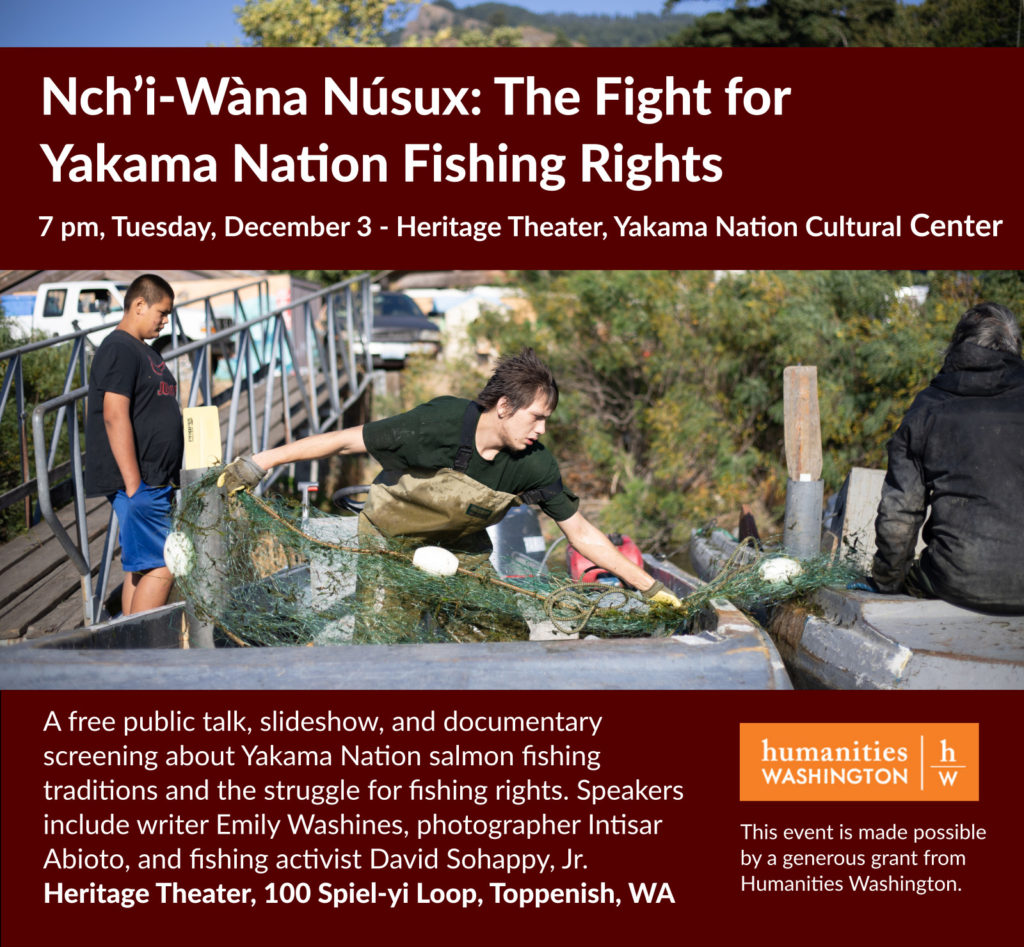
.
“Nch’i-Wàna Núsux: The Fight for Yakama Nation Fishing Rights”
7 pm, Tuesday, December 3
Heritage Theater, Yakama Nation Cultural Center
100 Spiel-yi Loop, Toppenish, WA
Indigenous people have fished for salmon on the Columbia River since time immemorial. Not just a way of obtaining food, fishing traditions are an integral part of Yakama Nation culture. In a unique multi-genre project, Cascadia Magazine (www.cascadiamagazine.org) has brought together two artists from different traditions to explore how marginalized communities defend their culture.
At 7 pm, Tuesday, December 3, join us in the Heritage Theater at the Yakama Nation Cultural Center in Toppenish for a free public talk, photo slideshow, documentary screening, and discussion about Yakama Nation salmon fishing traditions and the civil rights struggle for fishing rights.
Writer, poet, and activist Emily Washines of the Yakama Nation will be joined by Portland, Oregon-based photographer Intisar Abioto to share stories and photos about native fishing traditions on the Columbia River. In addition, Washines will talk with David Sohappy, Jr., a Yakama Nation member whose civil disobedience in the 1960s and 70s led to a court ruling recognizing fishing rights by state and federal governments.
The event will also feature a screening of the 1971 short video documentary “Little White Salmon Indian Settlement” by Harry Dawson.
In the 1960s and 70s, David Sohappy, Jr. and thirteen other Yakama Nation members fished the Columbia out of season in an act of civil disobedience that led to their arrest. A court ruling in 1969 affirmed rights to salmon granted in the 1855 Yakama Treaty and became the foundation of contemporary tribal fishing rights in the Pacific Northwest.
Emily Washines is a Yakama Nation member, activist, historian, writer, and poet, who is the founder of Native Friends, (https://nativefriends.com), a company dedicated to promoting Native American history, tradition, and awareness of the issue of Missing and Murdered Indigenous Women (MMIW).
Intisar Abioto is a photographer based in Portland and creator of the website The Black Portlanders (https://theblackportlanders.com), which documents people in the city’s African American community. Abioto took an interest in native fishing traditions after reading news stories about the U.S. government’s failed promises to improve facilities at native fishing camps on the Columbia River.
David Sohappy, Jr. is a Yakama Nation member who, along with his brother, mother, and father David Sohappy were among 14 fishers arrested in acts of civil disobedience in the “Fish Wars” of the 1960s, 70s, and 80s. Their court case, Sohappy v. Smith eventually led to recognition of native fishing rights across the Pacific Northwest.
This event is made possible by a generous grant from Humanities Washington (https://www.humanities.org/)


2 comments
Comments are closed.